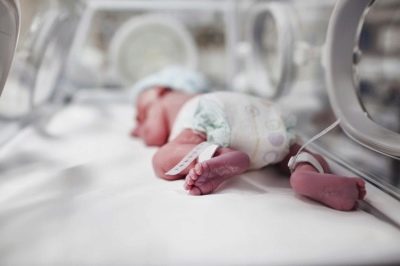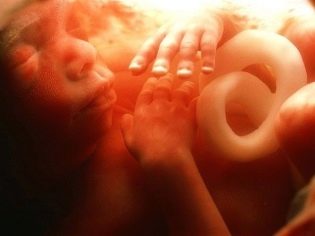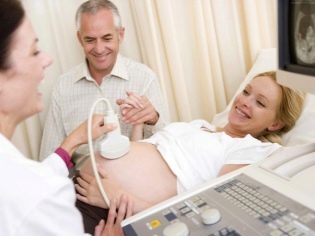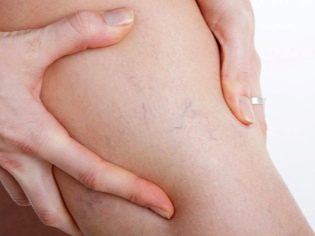23 week of pregnancy: what happens to the fetus and the expectant mother?
All the attention of a woman at week 23 is focused on the baby, because she already feels him well. Every day the movements are becoming more and more obvious, you can already feel it when the crumb begins to shove the mother from the inside with elbows or heels. A woman “gets acquainted” with her baby, according to his movements, starting to guess his character. This process gives pleasure to all its participants. About what this week is like, let's talk in more detail.
How many months is it
23 week of pregnancy - the second half of the second trimester. There are still 5 weeks to go into the third trimester.
If you focus on the usual calendar of all, then the sixth month of pregnancy began, but pregnant women and doctors count the time to birth in obstetric months. They differ from the usual ones in that each such month has exactly four weeks. If you do not deviate from the tradition, now the sixth obstetric month ends, exact time now - 5 months and 3 weeks.
The beginning of 23 weeks means that 21 weeks have gone from conception and 19 weeks have passed since the delay of the menstrual period, the first test, the pleasant notification of the new circumstances of family members. The conditional “equator” of pregnancy was successfully overcome more than a fortnight ago, and there are approximately 17 weeks left before the birth. At this time, everything that happens to the baby and his mother is already clearly visible to others. The activity of the baby is now felt not only by the mother, but also by the future father.
Feelings of a woman
Feelings of women this week may differ significantly: some are still fluttering and enjoying life, while others are already beginning to secretly dream of going on maternity leave to be able to rest.
The weight of a woman is growing, like yeast, it creates an increased load on the body. Now, the future mother gets tired faster, needs rest more often, she is already more difficult to give her usual daily activities. Feelings at 22-23 week are quite diverse.
Appearance
Most women look amazing. Their skin condition has improved, their hair has become thicker and shiny, their nails have got stronger. On the face, due to increased blood circulation, a blush appears from time to time, and the chest has grown a couple of sizes.
Even the fact that the waist is almost “dissolved” does not spoil the appearance, the hips have become wider, and the gait is more awkward. The tummy can no longer be hidden from prying eyes, it is already quite large, but still very neat and compact. The only exceptions are women who are carrying twins: they now have a pot belly that is already quite impressive in size.
This week, many are trying to figure out the shape of the abdomen about who the woman is carrying - a boy or a girl. According to the popular folk belief, the little girls who have the little belly have a “sharp little” belly and slightly protrude ahead, and the girls' future mothers have a more “spread” belly. Medicine does not see any relationship between the shape of the abdomen and the sex of the child, there are more accurate ways to determine the sex, and now they are available.
Some women show increased pigmentation, it will pass after childbirth. In all pregnant women, without exception, at week 23, the skin becomes more sensitive to sunlight, so you should be extremely careful with your tan.
Fetal movements
Baby movements are the main topic that pregnant women are discussing this week. All women by this time are quite distinct movements. They can not be confused with the fermentation of intestinal gases. If week 23 has begun, but there is still no movement, you should definitely visit a doctor and find out if everything is in order with the baby.It is possible that the deadline was set in error.
This week, many pregnant women begin to notice that the baby has its own daily regimen: periods of activity mostly occur at the same time. For most moms, it seems that at night their babies move more actively than during the day: these are the subjective feelings of the woman herself. During the day she walks, often changes her body position, does something, works, and therefore does not always focus on her feelings. Walking generally "swayed" and lulls the crumb. But at night, when mom relaxes and tries to rest, all her feelings become aggravated.
Kids are all different. Already, some are active and restless, while others are calm and drowsy. Therefore, the movements of different pregnant women are different, they can not be compared. Doctors recommend counting the number of fetal movements from the 28th week of pregnancy, so while a woman doesn’t have to consider anything, the main thing is to mark the activity as a fact.
If the child is too long (during the day) does not make itself felt, be sure to inform your doctor. If it moves continuously for almost a day, this is also a reason for consulting a specialist, since this may indicate hypoxia or other problems for the child.
Short pushes, uniform in time and cyclical - this is baby's hiccup. Now women can already feel it. There are no rules regarding the number of hiccups. Some babies hiccups rarely, others - often. If it seems to mother that her crumb hiccups too often, you should talk to your doctor about this, you may need to have an unscheduled ultrasound scan to make sure that there is no cord entanglement and the baby has no signs of hypoxia.
Pain sensations
Pain in the current period does not always indicate any violations during pregnancy. The uterus is already quite large, and it can not be felt by a woman.
Physiological, quite natural and explicable pains can now appear if the expectant mother has taken an uncomfortable body position, walked for a long time or was tired. Most often the backache hurts: the uterine ligaments stretch, the center of gravity changes, and it is this part of the female body that is under increased stress.
The discrepancy and softening of the pelvic bones already at this time may cause the future mom to have the pubic bone. Slight pain, which does not limit movement, do not interfere with climbing stairs, walking, sitting, should not cause concern. If the pain syndrome is quite strong, you should consult a doctor, the cause may be symphysitis. - Pathological discrepancy of the pubic symphysis.
The back hurts at week 23 not only because the woman gets tired of wearing her tummy, but also because her chest has noticeably grown. A comfortable bra with wide straps that will support the mammary glands and reduce the load on the back muscles will help to get rid of such pains. Tingling, "shooting" in the uterus, in the sides - also a variant of the norm. The growing uterus can squeeze the nerve endings.
Physiological pains do not have the ability to grow, intensify, are not accompanied by abnormal secretions from the genitals. Sometimes it is enough just to change the position of the body, walk, lie down, take a warm shower so that they pass. Severe pain, which is growing, is the reason for calling an ambulance.
Allotment
Control of secretions at week 23 should not subside. A woman should be attentive to their character. The only change that is now considered completely normal is a general increase in the number of vaginal secretions. Its increased production is natural for the current period, with its help the body tries to maintain the correct balance of the microflora of the genital tract.
Not too pleasant feeling of constant humidity in the perineum is easily eliminated by wearing thin daily pantyholes, they also help to see the changes in color or consistency of the secretion secreted. If blood discharge now appears, you should immediately call an ambulance, it can be a placental abruption, the onset of preterm labor.
Smearing spotting at week 23 most often speaks of insolvency of the cervix and manifestation of erosion. Considered dangerous and watery discharge.: it may be amniotic fluid. In every third pregnant woman with preterm labor at this time, the process begins with the discharge of amniotic fluid.
Green or gray discharge with a bad smell, resembling a rotten fish - a sign of infection of the genital tract, most often of bacterial origin. White and thick discharge, which “coagulates” like cottage cheese, has a sharp yeast odor - candidiasis or thrush.
Normal discharge now has a slight sour smell or is absent. They are white, light or yellowish lemon tint, homogeneous in consistency, not accompanied by itching and other unpleasant sensations. Any deviation from the norm is a reason for an urgent visit to the doctor.
Other sensations
A woman at 23 obstetric weeks becomes more attentive to her body. Therefore, it is not surprising that during the day she can record a variety of sensations. The most common on this term complaints that pulls the waist. The reasons for this phenomenon, we have already figured out. As for the rest of the “troubles”, now a woman can easily be overcome by a runny nose, in no way associated with a cold. This is a physiological rhinitis of pregnancy, its causes are covered with a slight swelling of the mucous membranes under the action of female sex hormones.
If you feel dizzy, there are headaches, be sure to talk about this with your doctor. Such symptoms often indicate an increase or sharp decrease in blood pressure. On this period, this happens with many women, because the amount of blood circulating in the body of the expectant mother has increased by almost 50%. The headache is usually in the evening, and in no case should a woman resort to painkillers: this is not an option.
Frequent urination at this period is not at all. If it is not accompanied by pain and pain, change in odor, transparency and color of urine, its quantity, then you should not worry - most likely, the reason lies in the pressure of the uterus on the bladder.
However, one should not ignore the frequent urination with pain, due to reduced immunity, women are now very susceptible to inflammation of the urinary tract and kidneys: cystitis, pyelonephritis, glomerulonephritis, etc.
Mood and psychological state
The stronger the figure of the future mother is rounded, the more complexes she may have. This is indicated by psychologists who work in women's clinics. Now a woman may begin to think that she is no longer so attractive, clumsy and does not arouse any interest in her husband. This can cause depression in pregnant women, as well as cause for family conflicts. There is really no reason to worry and worry, most men like the changes that have occurred in the female body, even if they do not speak out loud about it.
The woman now looks somewhat defenseless, and this, too, makes it quite natural for men to protect and care for their wife. The main thing is to avoid extremes: lack of attention, like hyper-care, does not contribute to mental equilibrium.
This week, many pregnant women are beginning to pay more attention to home improvement, shopping for a baby, psychologists call this an early manifestation of the so-called “nesting” instinct. On the whole, the world perception of women at this time is rather positive, because the main threats and dangers have been overcome, planned screening studies have been completed, and there is no strong fear of the upcoming births.
If, at week 23, a woman experiences bouts of irritability, cannot cope with her anger, she has difficulty in relationships in a family or team, she should definitely contact a psychologist in the antenatal clinic. The specialist will help to understand the causes of the situation and suggest options for the exit.
Changes in the body
In the first place in the mother's body comes the growth of the uterus. He and causes most of all the changes that are now visible in the health of women. If in the first trimester all hormones "managed", now it is time to physiological and anatomical changes.
Weight gain
A woman at week 23 may notice that weight has begun to arrive at a faster pace. This is a completely normal phenomenon, because the baby itself is gaining weight, and the amount of amniotic fluid, the mass of the placenta, also increases. However, too much weight is a real problem during pregnancy, which increases the likelihood of premature birth, and also complicates the childbirth and the postpartum period.
Therefore, a woman should definitely be weighed every week and track the dynamics, readings of scales should be entered in a separate notebook or notebook, so that at the next appointment you should acquaint the doctor with this information.
- for women who are underweight, the normal increase in week 23 is up to 7.8 kilograms for the entire period of gestation;
- women who have not had problems with excess weight or were slightly overweight, you can gain about 7 kilograms;
- for women who are obese before pregnancy, the norms are more stringent - not more than 3.6 kilograms.
If your real weight differs slightly from the norm - by 0.5-1 kg, that's okay. It is enough to adjust the diet and normalize weight gain.
If the increase to the 23 week of pregnancy has passed for 10-12 kilograms, you should definitely consult with your doctor, choose a sparing diet for pregnant women, donate blood for hormonal research, make sure there are no edemas.
Uterus growth
In the process of carrying a baby, the woman's uterus grows almost 500 times. More than half of this number is already available: this week the uterus is in the abdominal cavity, its bottom is felt about 3 centimeters above the navel. The location of the uterus is well determined by the woman herself, just as well pregnant women by this time study the signs and symptoms of the uterus tone, it is not difficult to determine it.
The height of the uterus flooring this week is in the range of 21-25 centimeters, most often it is equal to 23 centimeters. The length of the cervix is normal while it should not change, its size is 40-45 mm. A shorter neck at this time may be dangerous for carrying a child.because the fetus is rapidly gaining weight and the failure of the neck can not withstand the pressure and open up. Women with such a problem are recommended suturing of the neck with surgical threads or the imposition of obstetric pessary. Suturing is carried out at an earlier date. Now when establishing cervical insufficiency, preference will be given to the pessary.
A woman feels the uterus always when changing the position of the body, with an uncomfortable position.A growing reproductive organ already squeezes noticeably other organs of the abdominal cavity, which becomes a cause of disorders on the part of the digestive organs.
Woman suffering from heartburn, diarrhea, constipation. It is becoming more and more difficult to find a comfortable position for sleeping and having sex. A prenatal orthopedic bandage will help ease the condition.
Training bouts
Braxton-Hicks contractions at week 23 are not observed in all pregnant women. Since their nature and purpose has not been fully studied, it is almost impossible to predict which women will have false contractions and who will not. But one thing is certain: if the pregnancy is second or third, training bouts can be expected only in the last weeks before childbirth. But at primiparous false labor begins much earlier, perhaps already this week.
It is not difficult to distinguish them from other phenomena, the main thing is not to panic. During training, the uterus slightly comes to a tone, light squeezing sensations appear in the right and left sides, lower back, after which the tone "subsides", and the pulling pains disappear. Training fights at the current time may occur, but rarely and irregularly. They quickly disappear if the woman changes her body position, lies down for a half hour to rest or takes a warm shower.
There is no danger of such false labor for either the baby or his mother. The cervix with such small cuts in the body of the uterus does not open, even if the woman wears an established pessary. But to inform the doctor about the appearance of training fights is necessary.
Other changes
Colostrum can be released from a woman's nipples. Moreover, the probability that this will happen right now is higher for those who have already given birth and breastfed. The nipples that do not give birth are stronger, the ducts are narrow, their colostrum is less likely to be emitted.
Ugly stretch marks, which can also begin to appear on the body, and a woman’s breasts by this period are more pronounced in those who do not control weight and add it too quickly.
By the nature of the movements, women can already understand how the baby is located. If the crumb is pushed mainly down and all the time "fumbles" there, most likely, the baby is in headache, and the woman feels nothing more than the movements of the handles and the head.
Stirring in the middle or upper abdomen can be a sign of pelvic presentation. While the location of the baby in the uterus should not embarrass a woman, he still has a lot of time and free space inside the mother to roll over closer to the birth in the correct position.
Some women pay attention to the fact that at week 23, their visual acuity decreases slightly and their heartbeat quickens. This is due to the increased blood volume and blood pressure drops.
Thus, with a decrease in blood pressure, the retinal vessels of the eye narrow. Worry is not worth it, the vision will return to previous indicators after a while.
Baby development
Baby in the womb does not miss. It grows and gains weight. Moreover, weight gain began to flow faster than growth. Therefore, over the past week, the little one grew only slightly: he added only about half a centimeter to the growth. Now his height is just over 30 centimeters.
From the tailbone to the crown (KTR), the baby has grown to 23 centimeters. To imagine what a child looks like, you need to remember what a ripe ear of corn looks like. The size of the baby is comparable to him.
The baby weighs from 500 to 580 grams. From this week, children will start to differ more and more from each other in weight and height.. Embryos grow at about the same speed, but now hereditary factors, race, gender, and some features of the course of pregnancy, such as nutrition, availability of vitamins, the absence or presence of complications, etc., are beginning to affect height and weight.
Viability
This week you can congratulate the baby with another important stage in its development.Now it is officially considered quite viable. This means that if the waters are now gone and the childbirth begins, they will not be considered a miscarriage, but precisely childbirth, simply premature, and the baby will have chances of surviving outside of his mother's womb.
Of courseBabies born in the 23rd week of pregnancy are a difficult medical case. Despite all the achievements of modern medicine, neonatologists and resuscitators manage to save no more than 8-9% of such babies, and in most cases the predictions about their health are not the most optimistic: such children are mostly doomed to be disabled by sight, hearing, and deep violations. central nervous system. But there are exceptions.
What does a baby look like?
Outwardly, your child is now a full-fledged person, only still thin and small. However, his thinness can not be compared with the one that was a couple of months ago. Compared with himself earlier, the kid has noticeably prettier. He actively produces subcutaneous fat, and due to this, the skin is no longer transparent and red, the folds and wrinkles on it are gradually smoothed out.
The body of the baby is covered with a thick layer of cheese-like lubricant, it is held and it is not allowed to let down the vellus hair - lanugo. Most of the cheese-like lubrication is observed in the eyebrows, due to this, the face of the baby looks somewhat gloomy and serious, frowned. The legs grew older and proportionally became a little longer than the handles.
At the embryonic stage and later, the legs lagged behind the growth rates of the arms and head. The head now has the correct shape, it is very mobile due to the existing and existing neck. There are cilia on the face, thin nails grow on the fingers, each baby has its own individual pattern on the fingertips - an imprint. As long as the subcutaneous fatty tissue is relatively small, the legs, arms, and chest are the thinnest parts of the body: through the thin skin on it, you can count all the rib arches.
Nervous system
The kid masters new movements and skills, because the speed of passage of nerve impulses in his body increases significantly from week 23. He "hones" reflex skills. For example, the grasping reflex, already formed, from this week becomes more local, the baby can already grab something purposefully.
When the palms and soles are irritated, the baby spreads his fingers like a fan, and now he can flex the body reflexively if something touches his lower body. This week, the baby begins to acquire the reflex of the abdominal muscular wall, and the respiratory reflex can be stimulated when it irritates various parts of the skin.
The development of the brain continues, the second stage of the formation of the cerebral cortex is now completed: the grooves and gyrus begin to appear. About a million new neurons form every hour, the child acquires new neural and neuromuscular connections every day.
He already knows for sure whether he will be right-handed or left-handed. Now 75% of babies suck a cam of the very hand that will prevail.
Internal organs
All the internal organs of the baby are fully formed, now they need to grow a little, then to ensure the functioning of the child's body in an autonomous mode. The digestive organs are already working. A small heart knocks at a fast pace from 150 to 178 beats per minute. The kidneys produce urine, and the bladder can accumulate it. The urethra brings urine out into the amniotic fluid.
The kid swallows water, yawns, hiccups, can even spit. In its intestines, the original feces begin to accumulate, which is called meconium. The lungs are still immature, but they perform respiratory movements with an enviable constancy on a reflex level.
The endocrine glands and sweat and sebaceous glands work. Formed baby's own immunity. His natural protection is still insufficient to effectively counter all threats from the outside, but the mother’s antibodies to the crumbs are actively supported. Passing through the placental barrier, they form in these weeks innate (passive) immunity, which will protect the baby for the rest of the time in the womb and in the first months after birth.
Sense organs
Feelings of the baby develop as quickly as his body. At week 23, children can hear perfectly. They already have favorite and unloved sounds. They love the sound of my mother's heart, they are accustomed to other noises, which are enough in the mother's body: there is intestinal motility, noise of digestion, and rumble from the blood flow through the vessels.
The world outside the womb is still limited to my mother's voice. Foreign voices, loud and harsh sounds can frighten the baby, so now it is better to refuse to stay in noisy places, at large concerts.
From this week on, your child can open his eyes. He learned to blink, in general, distinguishes light from darkness, but there is no detailed vision yet, it will be formed gradually, and in the first days after birth, the baby, albeit vaguely, but still can see mother's face.
The processes responsible for the formation of the sense of smell are completed at week 23-24, and very soon the baby will be able to feel the first types of smells. Tactile sensitivity is very well developed, the kid is happy to study everything that surrounds him now, to the touch.
Baby on ultrasound
Planned ultrasound ended. The next woman is waiting only in the third trimester. At the 23rd week of pregnancy, an ultrasound scan can only be recommended for medical reasons, if the woman feels worse or has concerns about the condition of the child. Also, the future mother, if she does not have prejudices about the harm of ultrasound, can undergo this diagnosis herself, for example, to clarify the sex of the baby and get photos and videos that will show the child in all its glory. Women who did not undergo a second screening ultrasound scan will go to him this week.
The sex of the child this week is determined almost unmistakably. The boy is now very easy to distinguish from the girl, if, of course, the baby allows the diagnostician to examine his "charms". There are such little ones who close and turn away from the sensor, and in this case it is very difficult to find out the sex.
The development of the baby is judged by the compliance of the basic size norms. These dimensions in the complex are called fetometry, and for the current week such norms are typical:
Table of fetometric standards in the 23rd week of pregnancy
BPR, mm | LZR, mm | DBK (thigh), mm | DKG (length of the bones of the leg), mm | Shoulder length, mm | Forearm length, mm |
53-57 | 70-74 | 40-43 | 35-38 | 35-38 | 30-33 |
The belly of the baby at week 23 is 169-181 mm, the head circumference is 195-207 mm.
Possible hazards and risks
The risk of preterm birth at this time is not considered great, but you should not forget about this probability. Women with isthmic-cervical insufficiency, who have a higher risk than the others, are most often recommended to continue taking Utrogestan, while the rest of pregnant women who were prescribed this drug when threatened with interruption in the early stages were canceled after 18 weeks.
Even if the pregnancy is proceeding well, a woman to prevent the risk of having a premature birth should limit physical exertion, avoid stress, prevent falling and injury.
Immunity, which during the first trimester was carefully suppressed by the hormone of pregnancy with progesterone, is now very weakened, and therefore there is a very high risk of getting SARS, influenza or catching up on the banal cold. If this period falls on the cold season, when the overall incidence is increased, it is better to stay away from crowded places, shopping centers and clinics.The consequences of a cold are not as significant as the effects of a viral infection, and therefore it is necessary to comply with all preventive measures.
If the disease has occurred, a sore throat, a cough has appeared, the temperature has risen, in no case should you be treated at home with folk remedies or medicines. A woman is required to consult a doctor who will select a safe and effective treatment regimen.
Now the list of drugs that are allowed, has expanded significantly compared with the first trimester, some antibiotics are allowed, for example, Flemoxin, antispasmodics, such as "No-shpa, Sorbents and other groups of drugs.
As the load on the internal organs, compressed by the enlarged uterus, has increased, chronic diseases can worsen in a woman. If earlier she had a colitis or peptic ulcer, now the disease can manifest. There may also be problems with the joints, especially with the joints of the lower extremities, because the load on the legs also increased significantly.
The most dangerous complication in the current period may be preeclampsia. The true reasons for its occurrence are still unknown, but every pregnant woman should know the symptoms. The appearance of edema, both visible and internal, about which only a pathological increase in body weight, an increase in blood pressure, and the appearance of protein in the urine can "tell" are all signs of late toxicosis or gestosis.
Preeclampsia increases the likelihood of fetal hypoxia, placental abruption, premature birth, complications of childbirth. Therefore, it should be taken more than seriously. If the rings have ceased to be removed from the fingers, and the shoes suddenly become too small, in the morning the face looks edematous, you should always consult a doctor and get competent treatment recommendations.
Another danger is hemorrhoids and varicose veins. Circulatory disorders in the lower and hemorrhoidal veins are caused by the pressure of the uterus on these blood vessels. Problems contribute to constipation, irregular stools, violation of the rules of hygiene and diet.
Special underwear can help protect yourself from varicose veins - stockings, stretching legs and supporting vascular tone.
If hemorrhoids are manifested, you should definitely inform your doctor about this in order to get recommendations regarding the approved drugs for the treatment of an unpleasant delicate illness.
Analyzes and surveys
At 23 obstetric weeks, if the screening of the second trimester is successfully passed, only general urinalysis is prescribed to find out if everything is fine with the kidneys and the urinary system. At this time, the woman receives a referral to the laboratory for blood donation. It's time to retest for syphilis.
The second analysis is very important, because the incubation period for syphilis is quite long, and when registering the analysis could not show the existing disease or infection could occur later. By the way, you can become infected with syphilis not only sexually, but also in everyday life.
If for some reason a woman did not pass the second screening, now she can be recommended only by ultrasound: blood for the "triple test", which determines the concentration of hCG, alpha-fetoprotein and free estriol, is no longer taken - the study is too late and therefore not informative.
At the reception should now go every two weeks. If the pregnancy proceeds with complications, the woman may be recommended weekly visits to antenatal clinics.
Recommendations to expectant mothers
The chances of a lighter course of pregnancy without trouble and complications will be higher if the woman adheres to all the recommendations given by her doctor and her own common sense. Only an attentive attitude towards oneself and one's health will help to maintain vigor and gain strength before the forthcoming births.. At week 23 it is important not to forget about the following aspects.
Mode of work and rest
If a woman’s work is sedentary, it is now important to purchase a small bench so that you can put it under your feet. You should also more often make five-minute pauses to walk and warm up. This will help to avoid circulatory disorders in the pelvic and lower extremities.
Do not take on too hard work that requires physical effort. Now lifting weights and their movement is absolutely contraindicated.
Correct poses
Now is the right time to learn how to sit, stand, lie. Now even such simple tasks need an original solution. Do not sit, throwing his legs: this violates the blood circulation. Harmful, dangerous and already uncomfortable to lie on your back, because the large and heavy uterus puts pressure on the inferior vena cava.
After waking up, you should not jump out of bed abruptly, so as not to provoke nosebleeds, dizziness, fainting. First turn on your side, lower your legs from the bed, and only then you can slowly sit down and gradually get up.
Sex
There is nothing more enjoyable than sex in the 23rd week of pregnancy. This is evidenced by the numerous reviews of future mothers on the Internet. The libido of the woman is increasing, sexual desires are at their peak.
If a woman had not experienced an orgasm before, it is now very likely that this will finally happen. However, love joys require from the spouses more caution and prudence.
The choice of posture should be based on common sense: pressure on the uterus should be excluded, as well as excessively deep penetrations. From anal sex is also better to give up.
There are not so many contraindications for having sex at week 23 — it is the presence of a pessary or stitches on the cervix in the presence of cervical insufficiency, as well as individual threats, about which the woman must be informed by the attending physician.
Travel and travel
If a flight is scheduled for this week, there is no need to worry. The second trimester is considered the most favorable for air travel. Before the trip, it is advisable to check with the doctor if a woman has any contraindications. If there is a threat of premature birth, jumps in blood pressure, it is better to refuse to travel.
Until the 28th week, air carriers do not ask the woman for any certificates or documents about her state of health. Then you will need a certificate from the gynecologist that the flight is allowed. However, airlines have different requirements for transportation of pregnant women, and therefore, buying a flight ticket, it is better to clarify whether a confirmation certificate from the treating doctor is required.
Traveling by train, a woman needs to buy tickets to the lower seats in the reserved seat and the coupe. Special care now require a trip by car. The seat belt should fix the belly below. If a woman drives a car herself, she should put a small pillow under the waist - it will be more convenient and more useful.
Nutrition
If you now adhere to the principles of a healthy and balanced diet, you can avoid many of the complications of the work of the digestive system. Still need to eat fractional - 5-6 times a day. The amount of salt and sugar should be minimized. It is undesirable to eat fried, smoked, spicy and fatty.
The calorie intake should be increased by about 500 Kcal, since the child now needs a lot of energy to gain mass. Do not forget about fresh vegetables rich in coarse fiber. They will avoid constipation.
Positive emotional background
In the period from 22 to 23 weeks, the baby is already well feeling the slightest changes in the state of the mother. Perinatal psychologists say that the foundations of the baby’s worldview are now being laid, it is decided whether he will be an optimist or a pessimist. Therefore, the future mother should watch good movies and cartoons, listen to pleasant soft music, sing to her baby and read fairy tales to him.All this will help to create a sense of benevolence of the world, a crumb will feel welcome.
You should not loudly sort things out, communicate with unpleasant people who cause negative emotions, go to conflicts and listen to someone else's abuse. Only good emotions and inner peace will benefit both mom and her baby.
Pregnant Reviews
Some pregnant women at week 23 complain that movements of the fetus are not only distinct, but sometimes even painful. Weighty kicks and pushes from the inside at this time are most often felt by thin girls.
For many, now the choice of the name of the baby is relevant. Paul was determined, it is time to figure out what to call a baby. This question is caused by real family battles in some people, because not everyone can come to an agreement at once.
Some of the pregnant women indicate that they again manifest gastronomic oddities, which, according to doctors, should have been a long time ago. Therefore, at week 23, a woman may want only vegetables for 3 days, and then only cottage cheese for a whole week. Doctors warn that indulging in such oddities can cause a food imbalance that will surely make itself felt by failures in digestion or excessive weight gain.
About what happens to the fetus and the expectant mother in the 23rd week of pregnancy, see the next video.






























































